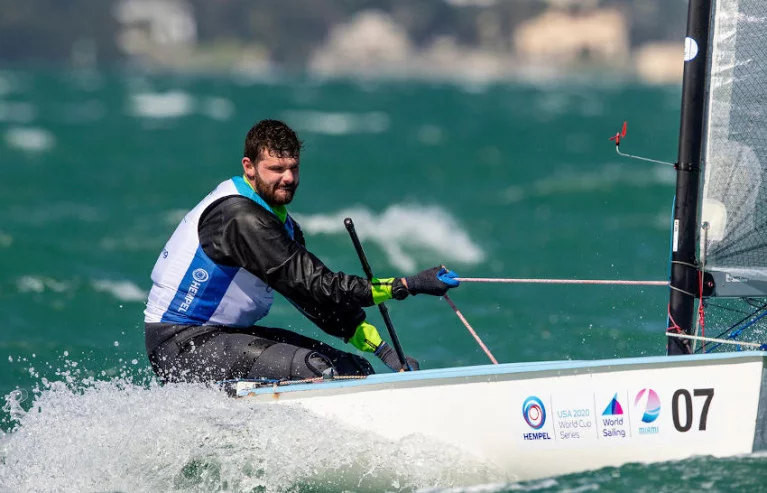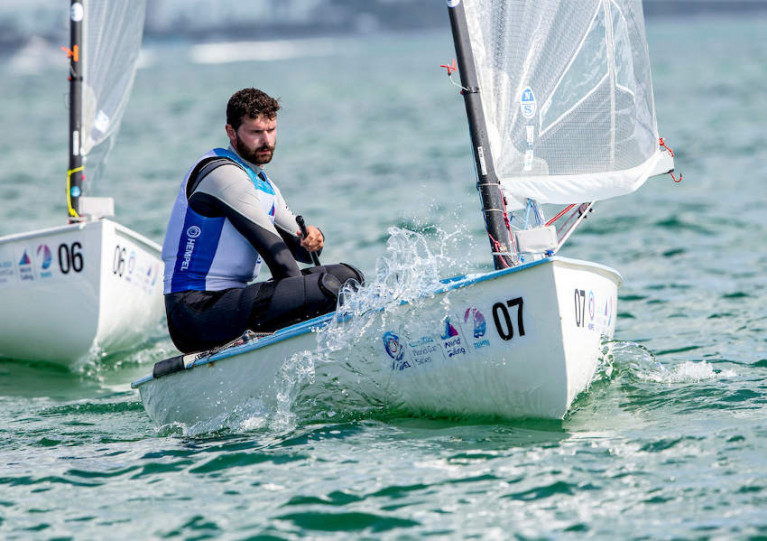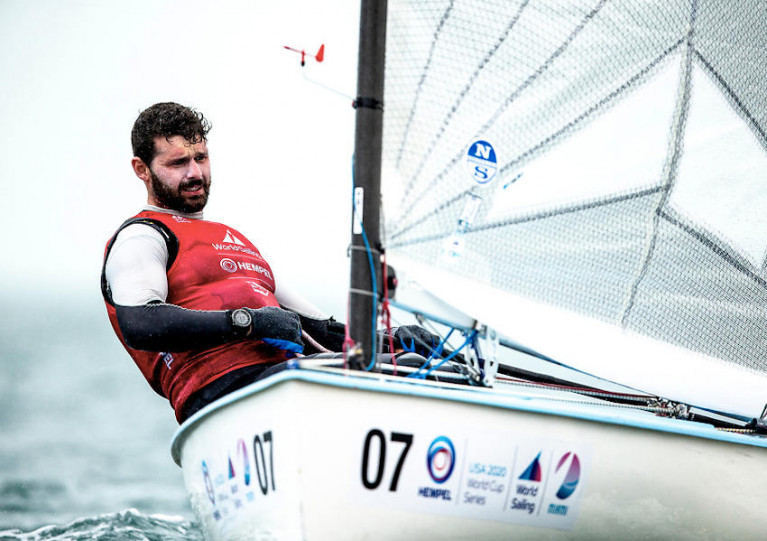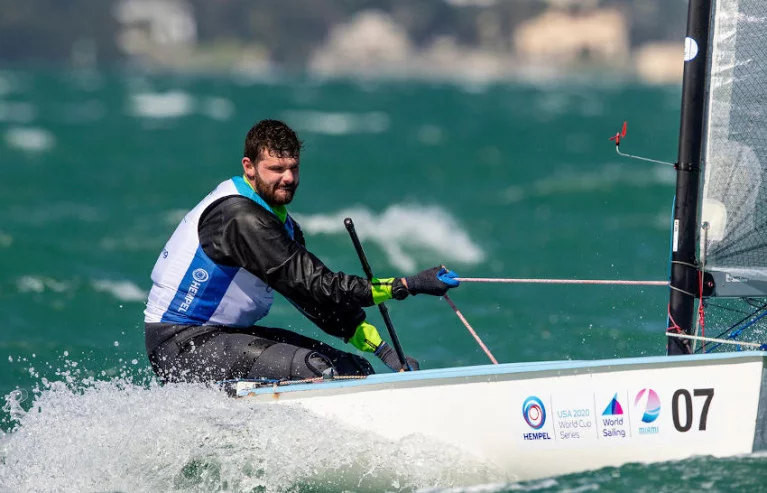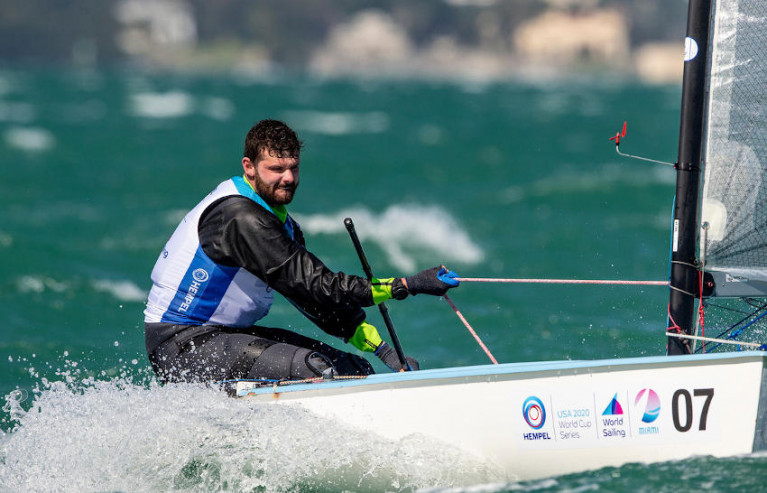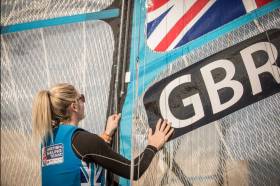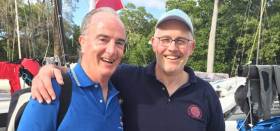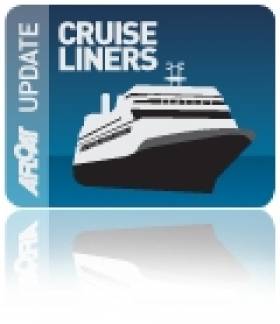Displaying items by tag: Miami
RYANI Congratulates Oisin McClelland On Miami Finn Result
The RYANI has congratulated Donaghadee sailor Oisin McClelland on his strong showing at the Hempel World Cup Series in Miami last week.
As previously reported on Afloat.ie, the Finn sailor from Northern Ireland finished fourth, just shy of the podium, after Saturday’s (25 January) medal race on Biscayne Bay.
RYANI chief operating officer Richard Honeyford said: “Oisin sailed well throughout the week in Miami. He secured three top three finishes in the 10-race series and really showed his skill in the stronger breeze.
“While he narrowly missed out on the bronze and a podium place in the end, Oisin’s hard work and training throughout the year really paid off.
“He is a fantastic role model for our young sailors and at RYANI we look forward to supporting Oisin as he continues in his campaign for the Tokyo Olympics.”
McClelland will have one more last chance to claim a spot in this summer’s Tokyo Olympics at the final European qualifier, the Hempel World Cup series event in Genoa, Italy from 11 April.
Oisin McClelland Just Shy Of Bronze In Miami Finn Medal Race
Northern Ireland’s Oisin McClelland was resurgent on the waters of Biscayne Bay yesterday (Saturday 25 January) but finished just shy of the podium after the Finn medal race at the Hempel World Cup Series Miami.
The Donaghadee Sailing Club stalwart finished fifth in the final, ahead of Luke Muller of the USA whose points total over the week was enough to secure the bronze for himself.
As previously reported on Afloat.ie, American Caleb Paine had already won Finn gold ahead of the weekend with his unassailable lead over Canada’s Kyle Martin, who took the silver medal and finished second in yesterday’s race.
McClelland will have his last chance to claim a spot in this summer's Tokyo Olympics at the Hempel World Cup series event in Genoa, Italy from 11 April.
Yesterday's Finn medal race can be watched back in full below:
Oisin McClelland Stands Fourth Heading Into Finn Medal Race In Miami
Northern Ireland’s Oisin McClelland was off form on Friday (24 January) on Biscayne Bay as two seventh-place finishes saw him slip from the third place he’d held in recent days to fourth overall, heading into the Finn medal race at the Hempel World Cup Series event today (Saturday 25 January).
The fifth and final day of fleet racing wrapped up with the light breeze posing more challenges for the 182 sailors from 45 nations across the 470, RS:X, Laser, Laser Radial and Finn fleets — and testing the nerves of those with so much at stake.
Friday’s weather forecast was mostly sunny with temperatures in the mid-20s C. The breeze was on the low end throughout the day in the 5-6 knot range, and prompted a lengthy postponement in the afternoon, following which only the Finns were able to complete their racing schedule.
However, Caleb Paine of the United States has already won Finn gold ahead of the medal race as he has an unassailable lead over Canada’s Kyle Martin.
Across the 10-race series, Paine has taken five race wins and four seconds. An 11th in Race 9 yesterday was his worst score of the week. Martin of Canada won Race 10 and now stands in second place. while Luke Muller (USA), who is even on points with Martin, is in third.
McClelland of Donaghadee Sailing Club now stands in fourth, three points behind Muller in the overall Finn standings, following his worst performance of the week after Race 1, since which he’d consistently finished in the top five (excepting a discarded eighth in Race 8) and even scored a first place in Race 6.
But overall his week in south Florida is sure to boost his confidence going into the Genoa World Cup and the European continental spot for the Tokyo Olympics this summer.
“I’m 100% focused on that and this event is a good warm-up,” he said earlier this week.
Today’s medal races will be available to watch live on YouTube starting just after 9am in Miami (2pm in Ireland), with the Finns currently scheduled to start at 11.24am local time (4.24pm Irish time).
Oisin McClelland Holds Third In Finn Fleet As Light Wind Hampers Hempel World Cup Series In Miami
Northern Ireland’s Oisin McClelland maintains third place in the Finn class at the Hempel World Cup Series in Miami as cold temperatures, wind chill, rain, strong breeze, and more typical South Florida conditions challenged the 182 sailors from 45 nations yesterday (Thursday 23 January).
The challenge has been real on Biscayne Bay and this has created exciting racing and a level of unpredictability adding more intrigue to the annual Olympic class regatta.
Heading into Day 4’s racing yesterday, the Finn, Laser, Laser Radial and Men’s and Women’s 470 had completed six races, while the Men’s and Women’s RS:X finished nine.
However, the breeze failed to co-operate for most of Thursday, as rain showers sporadically dampened the sailing venue, and racing was limited after lengthy postponements.
American Caleb Paine won his fourth race of the regatta in Race 7 of the Finn class. He was third in Race 8 and leads by 17 points over Luke Muller (USA). Oisin McClelland of Donaghadee Sailing Club holds on to third, just two points behind Muller.
Meanwhile, the RS:X women and men managed just one race each, as did the Laser class. There was no racing in the Laser Radial or the 470 fleets.
Additional races are scheduled for the 470, Laser Radial and Laser today, Friday 24 January, with an earlier start time of 10.30am local (3.30pm Irish time).
Oisin McClelland Third In Finn Class Amid Unexpected Miami Conditions At Hempel World Cup Series
The 182 sailors embraced the challenge of the uncharacteristically cold and blustery conditions in Biscayne Bay on Day 3 of the 2020 Hempel World Cup Series Miami yesterday (Wednesday 22 January).
The athletes were faced with similar conditions on Tuesday, but Wednesday's overall shifty conditions and wind chill presented an even greater test of their physical and tactical skills.
Northern Ireland’s Oisin McClelland is in third place in the Finn class and trails American Luke Muller by three points. McClelland won Race 6 and placed fourth in Race 5.
“I managed to come out with a fourth and a first. A few people tipped it in, but I managed to stay upright and took the win,” said the Donaghadee Sailing Club stalwart.
Miami is the final opportunity for North Americans to qualify for Tokyo 2020, but the final stop of the 2020 Hempel World Cup Series in Genoa is the last shot for Europeans — McClelland included.
“The major goal for me is the Genoa World Cup and the European continental spot. The only one left for Europe. I’m 100% focused on that and this event is a good warm-up. There’s a couple of us here who are going for the spot — Ukraine and Russia. It’s a good early test to see how we’re going.
“We had some goals in mind for what I wanted to get out of this regatta — technique wise — but if the week goes well then I'd be really be pleased with a podium.”
Racing resumes at 11am EST (4pm Irish time) today, Thursday 23 January.
Finn Lynch in Action in Miami, Saskia Tidey Debuts for Team GB
The first stop of World Sailing's 2017 World Cup Series, the first on the road to Tokyo 2020, sees just one Irish entry from over 450 competitors across the ten Olympic classes from Regatta Park at Coconut Grove, Miami from 24 – 29 January.
Carlow's Finn Lynch will compete in the mens Laser class, a fleet that looks strong with the close training group of Rio 2016 silver medallist Tonci Stipanovic (CRO), 2016 Sailing World Cup Final winner Pavlos Kontides (CYP) and Ireland's youngest Olympic helmsman Lynch not only taking on each other, but fierce competitors like Germany's Philipp Buhl who has won multiple Sailing World Cup titles and 2015 and 2016 Laser world champion, Nick Thompson (GBR).
Also racing is Saskia Tidey, the Irish 49erfx sailor from Rio 2016 who is now sailing for Team GB for Tokyo 2020. The Dun Laoghaire sailor will make her Tema GB debut with Charlotte Dobson on Biscayne Bay.
Miami welcomes back five of the 2016 edition winners as well as 2016 Sailing World Cup Final champions while sailing 'legend' Robert Scheidt changes the One Person Dinghy for the Two Person Skiff.
Royal Cork's Viper 640 Second in Winter Cup Regatta
Anthony O'Leary, Robert O'Leary and Tom Durcan were narrowly pipped for an overall win in the Viper 640 EFG Winter Cup Regatta in Miami at the weekend. The Royal Cork trio sailing 'Antix' finished second overall where there were two days of big winds in a 16–boat fleet. O'Leary was beaten by the UK's Lawrence Crispin, third was John Dane, the USA Star 2008 Rep from Beijing.
The Crosshaven helmsman is back on Biscayne Bay tomorrow for the 2016 Bacardi Cup regatta where he finished seventh last year. (Gremlins caused an earlier misreport of the 2015 results). Strong winds are forecast for this week's event.
The Viper 640 sportsboat fleet is coming to Volvo Cork Week this July.
Irish 49er Duo Take Miami Silver Fleet Race Win
Torrential rainfall and a chill in the air, Miami isn't usually like this, but competition for World Cup honours and Rio 2016 Olympic spots are keeping the temperatures on Biscayne Bay hot. Ireland's crews are not in the running for medals this week but Belfast's Ryan Seaton and Matt McGovern took a race win in the silver fleet yesterday leaving them 38th overall in their 61–boat fleet. Irish rivals for the Rio berth Annalise Murphy and Aoife Hopkins are placed 59th and 60th respectively overall in what is the second round of the Irish selection trial.
Competitiveness from the front to the back of each fleet has been evident and every sailor has something to fight for. Whether it's the coveted Rio spot, a Sailing World Cup honour, internal qualification for Rio 2016 or even striving to perfect their game, it's all on in Miami.
Sailors were made to wait for racing on Thursday as torrential downpours killed off the breeze and produced large quantities of surface water. When the breeze materialised it enabled the sailors to commence racing at 15:20 local time in building conditions that ranged from 12-17 knots from the south east.
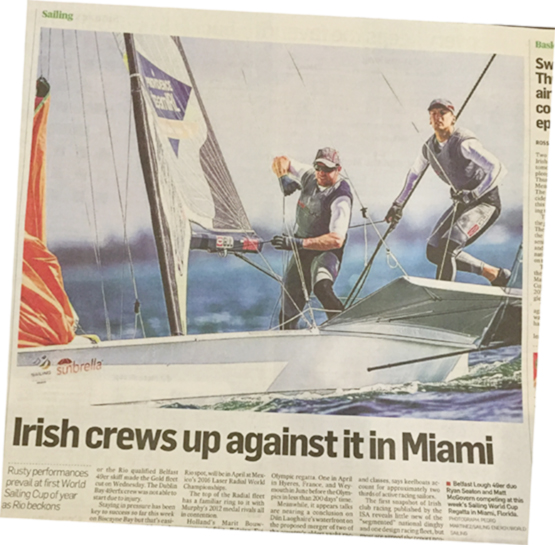
Ryan Seaton and Matt McGovern took a race win in Miami yesterday and made the headlines in this morning's Irish Times Newspaper.
49er and 49erFX
A single race in the 49er Gold, 49er Silver and 49erFX was completed.
Diego Botin and Iago Lopez (ESP) and New Zealand's Alex Maloney and Molly Meech held on to top spot in the 49er and 49erFX respectively. Race wins went the way of John Pink and Stu Bithell (GBR) in 49er Gold, Ryan Seaton and Matthew McGovern (IRL) in 49er Silver and Ida Marie Nielsen and Marie Olsen (DEN) in the 49erFX.
On the Rio 2016 Olympic qualification front, there is plenty happening in all three fleets.
Chilean brothers Benjamin and Cristóbal Grez Ahrens haven't made things easy on themselves in their battle against Uruguay's Santiago Silveira and Philipp Umpierre for the South American 49er Rio spot. A disastrous start and up and down results gave the Uruguayans the advantage after two days.
The Uruguayans were positioned to make the gold fleet with the Chileans back in silver ahead of Wednesday's so they had it all to do. Match racing was the name of the game and the Chileans forced the Uruguayans hand with an OCS and BFD to squeeze them back into silver fleet.
Thursday was an opportunity for both teams to reset and from a single 49er Silver race, the Grez Ahrens brothers grabbed the initiative, leapfrogging the Uruguayans. A Chilean ninth compared to the Uruguayans 18th ensures they go into the final day of fleet racing with a six point advantage.
In the north, gold fleet racing will decide the spot. USA in the driving seat with Thomas Barrows, III and Joseph Morris seventh on 71 points. Canada follow with David Mori and Justin Barnes 29th on 104 points and British Virgin Islanders Alec Anderson and Christopher Brockbank are down in 31st.
American sailors Paris Henken and Helena Scutt as well as Emily Dellenbaugh and Elizabeth Barry have put their nation in a strong position to qualify in the 49erFX. Henken and Scutt are 18th on 142 points and their compatriots, 21st on 161. Their nearest rivals are U.S. Virgin Islanders Mayumi Roller and Agustina Barbuto who trail on 181 in 23rd. Aruba's Odile and Philipine Van Aanholt hold 226 points in 32nd.
Chile's Arantza Gumucio and Begoña Gumucio are the only South American entrants who have not yet qualified for Rio 2016 so will qualify this week.
Laser and Laser Radial
A very fluid weather pattern (in more ways than one) made for a challenging, albeit short, day on the water for the Laser and Laser Radial fleets. The threat of thunderstorms kept the fleet ashore through the early afternoon. Once the sailors launched, the compressed time left the sailors with little time to properly research the breeze. Adding to the confusion, the weather changed just as the Radials were halfway up the first leg.
"In the beginning it was quite light,” said Evi van Acker (BEL). "But then the rain came and along came the wind. So it was quite windy in the race, which was nice to have a little bit of difference compared to the first three days.”
It was also quite shifty and, with the visibility reduced, tough for the sailors to formulate a plan of attack. As is often the case in difficult conditions, the cream rose to the top, with Marit Bouwmeester (NED) nipping Sarah Gunni Toftedal (DEN) by just two seconds and adding to her impressive string of four first-place finishes in the qualifying races. But Bouwmeester was hard-pressed to describe how she won the race.
"I don't really know,” she said with a laugh. "The weather was quite tricky with the rain so I think I was just a bit lucky being on the right side of the wind shifts.”
Bouwmeester, who won the silver medal at the 2012 Olympics and the 2015 Laser Radial World Championships, is probably being modest. But her day did have one significant, and totally unexpected, hurdle that she handled with a veteran's poise.
"A 470 trailer, they didn't put it up right after the 470 went into the water and it fell down and it fell straight through my sail,” she said. "So just before [launching] I had a hole in the sail. But thank God it didn't influence the racing too much
"I didn't like it. I was like, 'Bloody 470s.' But there's not much I can do about it. This guy gave me some sail tape and I tried to cover it up as good as I can.”
In third in the race, and sitting solidly in second overall was van Acker, who was a little more expansive when asked about the path to success in Race 6.
"I think play the shifts on the first beat and the first reach and the downwind,” she said. "But I could've done a bit better. So not super happy with today, but plenty to play for tomorrow.”
Van Acker is the defending Olympic bronze medalist, but there's a lot of Laser Radial talent in Belgium and she won't know until late spring whether she'll return to the Olympics.
"We have a selection committee that will decide at the end of May or the beginning of June,” she said. "But as I said, I'm not really busy with the selection, just trying to do my best in every race.”
Currently sitting third in the overall standings is defending Olympic gold medalist Lilja Xu (CHN) who finished 35th, by far her worst race of the regatta. After discarding that finish she is just two points out of second and eight points off the lead.
Paloma Schmidt was the only South American sailor, who had not yet qualified for Rio 2016, to make the Laser Radial gold fleet. As a result, she has qualified Peru in the Laser Radial.
North American sailors from the Cayman Islands, Cuba, St. Lucia and Trinidad and Tobago missed out on the gold fleet as Bermuda's Cecillia Wollman and Mexico's Natalia Montemayor advanced.
Nine points separated them before Thursday's racing but they ended up even on 95 points apiece after the single race. Wollman finished 39th and Montemayor, 40th. Results would lead to suggest some strong tactics coming in to play with three races on Friday to determine who will go to Rio de Janeiro this August.
After sailing a nearly flawless qualifying series, Rutger van Schaardenburg (NED) had his first significant bobble of the regatta when he was caught over the line before the gun and didn't return to start correctly, recording a 50-point OCS. As he's able to discard that score, he retains the overall lead, but the margin has narrowed. Jean-Baptiste Bernaz (FRA) is currently second overall after getting a fourth today.
While the Radials started in light breeze, the wind had picked up substantially by the time the Lasers started sailing. Still, the weather was difficult to read.
"I didn't have [a really solid plan for the first beat],” said Bernaz. "I just say, 'OK, let's sail and watch; what you see is what you get.' I was on the right, but when I saw the left gaining, I just go on the left side of the fleet. I was losing a lot and I re-gained what I lost. I was fourth at the top mark, third, then fourth again. It's good to sail in front.”
Bernaz has been on a tear of late, with top-five finishes in his four of his last five major regattas. The lone blip, a 54th at the 2015 Laser World Championships, has knocked his world ranking down to 22nd, but he's sailing like a medal contender at this event.
"It's the year of the Games, some [Olympic selection series] for different countries, so everyone is 100 percent, maybe 110,” he said. "It's a really hard fleet and it's really hard to be consistent. Now we start the finals, so it's the top 49, so it's really hard, really compact.”
Sailing to his fourth second in the last four races, five-time Olympic medalist Robert Scheidt (BRA) moved into third in the overall standings.
"The first few races I had bad starts and it was difficult conditions, it was shifty and light, and I just made bad decisions at the beginning of the race,” he said. "I knew I had the speed to do better and the ability to do better. From the third day I started to sail more with the fleet, more consistent, better starts.
"Today was a full-on race, it started to blow very hard just a few minutes before the start and we knew we'd have to be out of trouble, have a clean start, and use the speed and hike hard. It was a tough race. The breeze kept increasing throughout the race. I just sailed clean, sailed a solid race. I'm really happy about that.”
Scheidt won three medals in the Laser class, gold in 1996 and 2004 and silver in 2000 before switching to the Star, where he won silver in 2008 and bronze in 2012. With the Star eliminated from the Olympic roster, he was forced to choose between missing the Rio Olympics or returning to the grueling 14-foot dinghy,
"The goal is to try to do the Olympic Games in my home country,” he said. "Unfortunately the Star is not anymore an Olympic class. I wish it was. It's not easy to come back to the Laser after a certain age. But I'm enjoying it. I'm still having fun out there. I'm still competing at a high level. Of course, it's not easy because physically it's a quite a demanding boat. Right now I'm in a good moment, free of injuries and really looking forward to the next six months.”
He hasn't been as dominant as he was at his peak, when he won eight world championships, but Scheidt is a serious medal threat, and anyone who thinks the pressure of competing in his home country will compromise his performance should check Scheidt's track record. Among other accomplishments, his final Laser world championship was won on Brazilian waters. He knows what to expect, and how to handle it.
"It's going to be a different Olympics with the crowd the expectations, competing in Rio, a place I've sailed all my life, for an Olympic medal,” he said. "It's going to be very special. That's why I'm still doing it. That's the reason why I'm still training hard, pushing hard. To be able to join the Olympics one last time would be a great thing for me.”
Mexico's Yanic Gentry made the gold fleet in the cut and with none of his rivals from Bermuda, Cayman Islands, Dominican Republic and Puerto Rico making it, he has qualified his nation in the Laser.
All of the South American sailors aiming for Rio 2016 are in the silver fleet and no racing was possible on Thursday. As it stands, Venezuela's Jose Gutierrez is 65th on 139 points, Uruguay's Federico Yandian 66th on 140, Ecuador's Matias Dyck on 145 and Colombia's Andrey Quintero 84th on 180.
Irish Olympic Sailors Miss Gold Fleet Cut at World Sailing Cup, Miami
Tricky conditions have got 2016 off to an inauspicious start for Ireland's Rio Olympic sailing team with neither Laser or 49er making the gold fleet cut of the World Sailing Cup in Miami, the first major event of the Olympic year.
The 49erfx crew of Andrea Brewster and Saskia Tidey was not able to start due to injury. The Irish Paralympic Sonar crew of John Twomey, Austin O'Caroll and Ian Costelloe are lying seventh from nine.
In the second round of the Irish Laser Radial trial being sailed as part of the Florida–based regatta, the 2020 prospect Aoife Hopkins from Howth Yacht Club lies 60th, just one place behind the National Yacht Club's Annalise Murphy in the 81–boat fleet. Results after five races indicate both will race in the silver fleet for the balance of the regatta that concludes on Saturday. Murphy will be disappointed at scoring two penalties in the early stages but also with the fact that she was unable to make the top ten in any race, just seventh months out from the Games itself.
A premature start in race nine added to a black flag penalty scored in race two puts Ryan Seaton and Matt McGovern from Belfast Lough in 39th overall from 61 in the mens 49er class. Nine races have been sailed.
Full results are here.
The regatta got off to a flukey start on Monday and Tuesday and although the breeze blew stronger yesterday, Irish boats had a mountain to climb in order to get back into any sort of gold fleet contention. Unfortunately for Team IRL, however, Rio rivals appear to be able to knock in top results in any weather. A case in point is the unstoppable performance of Murphy's London 2012 rival, Marit Bouwmeester (NED) who has won all five of her remaining qualifying races to open up a four-point lead. Evi van Acker (BEL) another veteran and fellow Olympic medalist, has won a pair of races herself and was able to discard a black flag disqualification from today to sit second. Defending Olympic gold medalist Lilja Xu (CHN) in third, a point further back.
Had a tough day on the water. Two more days left so will refocus and do my best. On wards & Upwards!Aoife x
Posted by Aoife Hopkins Sailing on Wednesday, 27 January 2016
With qualification completed, the fleet will be split into a gold and silver grouping and winning the races will be that much tougher over the final two days.
The top American in the fleet is Paige Railey, who is currently 17th with 36 points. That's good enough for a 9-point cushion over Ericka Reineke (USA), who is Railey's chief rival for the 2016 Olympic berth in the Radial class. That battle will be an interesting one to watch during the next few days. This event is Part 1 of the two-stage selection series for that class.
The Laser class, one of only two to start the Day three on schedule, sailed a pair of afternoon races. Rutger van Schaardenburg (NED) won his final race of the day—as with the Radial fleet, the 98-strong Laser fleet has been sailing in two groups for qualification—and has built himself an impressive 16-point lead heading into the gold and silver fleet split. Jean Baptiste Bernaz (FRA) sits second with 27 points, but there is a pack of four sailors all within 5 points of the silver-medal position. At the back end of this group is 5-time Olympic medalist Robert Scheidt (BRA), who has rebounded from a tough start with three straight second place finishes.
Charlie Buckingam (USA) is the top American in 11th. While he has his sights focused on the top 10—only the top 10 in each class qualify for Saturday's medal race, which will be carried lived on ESPN3—Buckingham has to be comforted by the knowledge that the next American sailor is 20 points behind. As with many of the other classes, this regatta serves as the first part of the selection trails for the U.S. Laser berth in the Rio Olympics.
49er and 49erFX
The 49er qualifying series concluded with three further races on Wednesday ahead of the fleets separating into Gold and Silver for the duration of the World Cup.
Diego Botin and Iago Lopez (ESP) advanced to top spot in the 49er, recording an 8-4-3 to leave them on 45 points. The Spanish duo tend to excel in the qualifying series and more times than not, come out at the top of the leaderboard.
When push comes to shove and they race in a top quality Gold fleet they fall down the pack. Six Gold races are ahead of them now to see if they can buck the trend. Carl P Sylvan and Marcus Anjemark of Sweden follow in second and Jorge Lima and Jose Costa (POR) are third.
Defending 49erFX champions Alex Maloney and Molly Meech (NZL) moved up to first after four good races. A pair of seconds, a seventh and a sixth hand them a ten-point advantage over Jena Mai Hansen and Katja Salskov-Iversen (DEN).
Dublin Port Shows Off Cruise–Liner Plans at Miami Exhibition
#dublinport – Dublin Port took the opportunity to display a computer-generated image of what the East link bridge area of Dublin might look like at high water with a large cruise liner in the proposed berth when it attended the recent cruise–liner show in Miami, Florida.
Looking eastwards down the river Liffey, the artist's impression shows off the port company's plans for cruise liner berthing as previously reported by Afloat.ie last March. Dublin Port Company plan to redevelop the Alexandra Basin to include two berths for cruise ships of up to 340m in length which will accommodate ships that are significantly larger than the current maximum length of 300m.
Similar berthing plans for the massive ships are also underway across the bay in the south Dublin port of Dun Laoghaire.
The global cruise industry's premier annual international conference and exhibition in Miami drew more than 11,000 attendees and nearly 900 exhibiting companies from over 125 countries.
Dublin Port exhibited as part of 'Cruise Ireland', the island's association of Ports, Shore Excursions Operators, Tourism Organisations, City Councils who share the common objective of making the island of Ireland and all it's charms more accessible for the international Cruise Markets.
The computer-generated image is by New York based architecture firm Bermello Ajamil, whose projects include 'The World in Dubai', one of the most innovative land reclamation and development projects ever attempted.
Cruise Ireland was formed in 1998 after a few tentative years of individual Ports and regions successfully attracting cruise ships. Today the Ports of Ireland play host to some 300 cruise visits each year which is testament to the efforts made by the members of Cruise Ireland.
Each year the members bring improved facilities, unique tours and excellent service to the Cruise industry and the cruise guests who choose to visit.



























